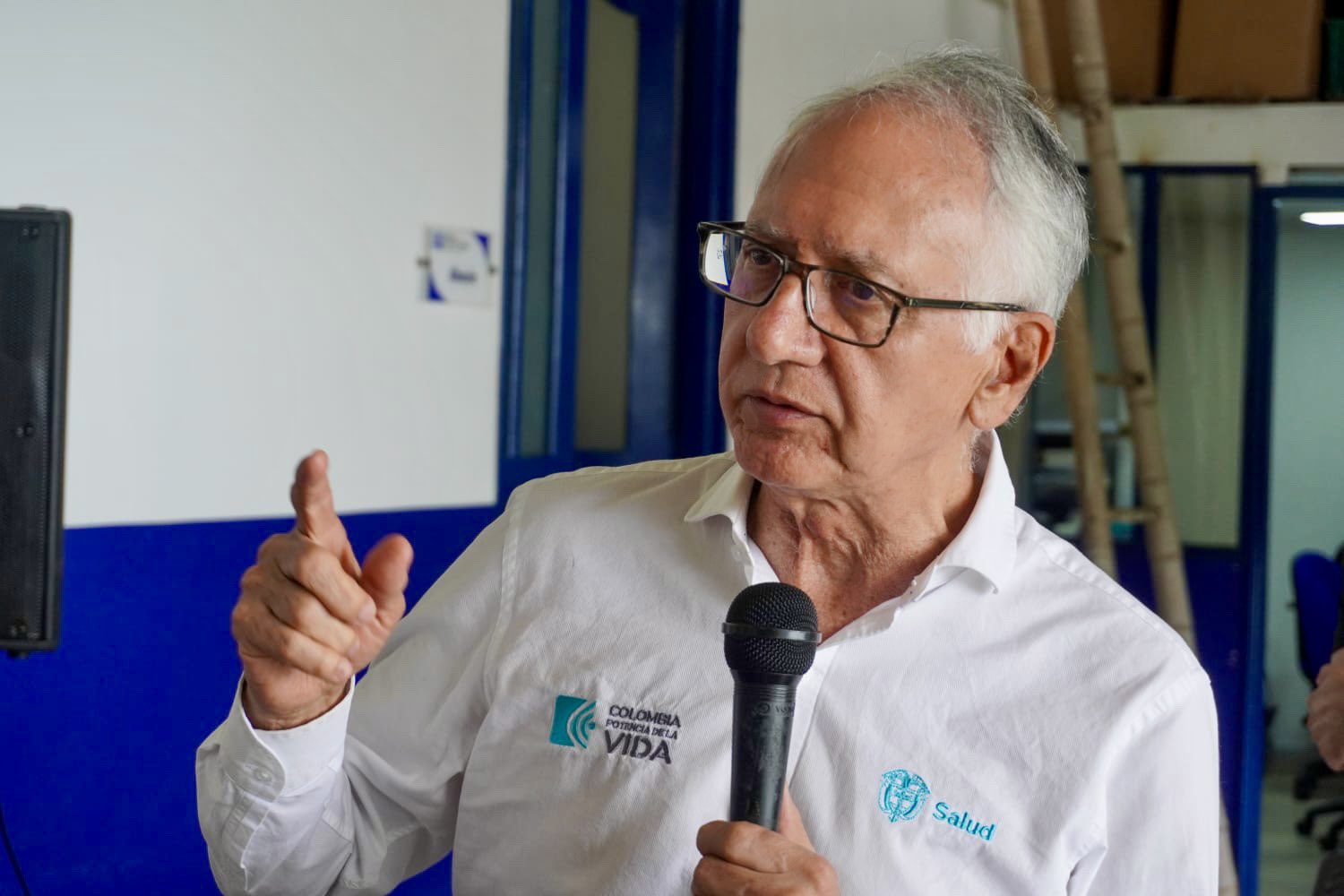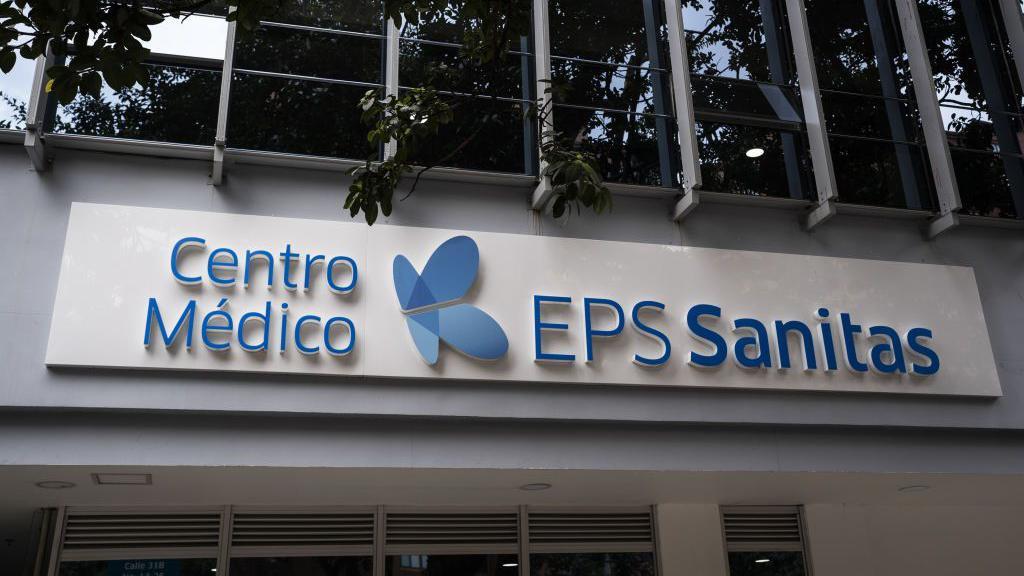César Gaviria asks the Prosecutor's Office to investigate Minister Guillermo Alfonso Jaramillo for his handling of health issues.

Former President and Liberal Party leader César Gaviria has requested that the Attorney General's Office open a formal investigation against Health Minister Guillermo Alfonso Jaramillo for possible willful misconduct for allegedly contributing to "systematic underfunding" and the "progressive deterioration" of the right to health.
For the former president, chronic underfunding, institutional fragmentation, the progressive collapse of health insurance companies, and systematic delays in payments to hospitals and professionals have created an unsustainable situation that threatens effective and timely access to healthcare.
According to the Reds, the government ignored all warnings about the health system . "This responsibility does not fall exclusively on the minister, but also on the Health Superintendency and all those officials who, by action or inaction, have facilitated the institutional collapse. This conduct could constitute disciplinary, fiscal, and possibly criminal offenses, and must be subject to a rigorous and independent investigation," Gaviria stated.
In this regard, the Comptroller General's Office and the Attorney General's Office were asked to determine the corresponding responsibilities.
The full statement 
Former President César Gaviria. Photo: Liberal Party
The Constitutional Court has been clear: the right to health in Colombia is fundamental, autonomous, and inalienable. Ruling T-760 of 2008 and Statutory Law 1751 of 2015 consolidated this recognition and mandated structural transformations. However, critical flaws persist, which the government has exacerbated.
The Court's Monitoring Chamber has documented serious setbacks: underfunding of the Per Capita Payment Unit (UPC), disregard for rulings C-978 and C-979 of 2010, exclusion of key stakeholders from technical committees, and the use of inconsistent data to calculate the system's financial adequacy. The consequences are evident: an exponential increase in the number of writs of protection (265,000 in 2024), a drop in enrollment (from 99% to 96.5%), and a collapse in care due to a lack of supplies and payments.
The government has been warned repeatedly. The Comptroller's Office found that the EPSs have accumulated a debt of $32.9 billion, 16 have liquidity problems, and only six meet financial requirements. The Nueva EPS—with 11.5 million members—has not even submitted financial statements. The cash flow crisis has jeopardized access to medicines, payment to medical personnel, and the sustainability of services.
Despite this, Minister Jaramillo has ignored rulings, intervened in entities without due process—as in the Sanitas case, where the Court declared a violation of rights—and promoted measures that deepen the collapse. A few months ago, I stated that suing health insurance companies while failing to provide state funding is an unlawful act and a violation of Ruling SU-480 of 1997.
Added to this is the complaint that the recent decrees fail to solve the structural problems and, on the contrary, could dismantle the system without offering a functional alternative. The disarray in care, the lack of fiscal control over contractual modalities such as the PGP, and the 23% increase in PQRs are symptoms of an induced crisis.
Today, the system isn't collapsing due to a lack of diagnoses, but rather due to negligence in addressing them. The warnings were issued by the Supreme Court, the Comptroller's Office, and experts . Ignorance is no excuse. And the lives of millions of people are at stake.

Guillermo Alfonso Jaramillo, Minister of Health Photo: Ministry of Health
In any case, millions of citizens today live with uncertainty about the continuity of their treatments, the functioning of their providers, and the viability of the reforms. Health, as a fundamental right, cannot continue to be held hostage to political disputes or ideological interests. Faced with this crisis, the Liberal, Conservative, and U parties proposed in 2023 a path of responsible reforms, within the framework of the current system, which the Constitutional Court has endorsed, affirming in Ruling C-378 of November 2023 that there is no prohibition against EPSs operating for profit and that the current system was within our constitutional order.
From the outset of the debate that began at the Casa de Nariño (Narino House) and whose objective was to discuss with the president the possibility of the government funding the financing of marginalized areas for which we lacked resources, former minister Carolina Corcho made the government's intention clear: to eliminate the EPSs and directly allocate those subsidized resources to a new state structure. This translated into a deliberate and methodical strategy to provoke an explicit crisis, calculated to ensure the system remained public, without considering that such a methodology, by then, would already run counter to the rulings of the Constitutional Court. Recently, President Gustavo Petro was blunt: "I do nothing and let it happen."
This, despite the fact that the three parties, sensibly and with careful work, proposed a solution that corrected the system's flaws without disregarding the provisions of the Constitutional Court, and without making changes that were unnecessary and incompatible with profound changes to the system. But from that moment on, the Minister opted for the path of systematic disregard for the law, engaging in what constitutes open and systematic contempt of court decisions.
The intention was brutally confirmed. With a frankness bordering on cynicism, the current Minister of Health, Guillermo Alfonso Jaramillo, publicly acknowledged that the EPSs are being taken "to intensive care" while an attempt is made to impose a widely questioned reform that ignores the rulings and orders of the Court to date. This wasn't a slip of the tongue: it was an open confession of a strategy of institutional suffocation. It is well known that statements that these debts would be paid, which will not happen, are untrue.
Reports indicate that the fiscal situation will be the reason the State will cite. The government lacks the fiscal resources to pay the multimillion-dollar debts it owes to the system. The situation is worsening. The minister himself has declared that the EPSs serve only as a "curtain" while his new project is approved. But without payments, the system will soon collapse, and what will remain will be a rickety, bankrupt system, barely functional to serve the poorest. I'm sure President Petro is unaware that this is a problem looming over him.

The Sanitas EPS, with 5.7 million members, was one of those affected. Photo: Getty Images
As I'm sure, when the government began comparing our indicators with those of the OECD, the latter were overwhelmingly from developed countries. Colombia and other Latin American countries were driven there by the crisis generated by the creation of the FTAA with the Mercosur countries, but as we said then, it was an inappropriate comparison. The government insisted that our system was bad, when it was better than that of the vast majority of developing countries. In fact, it was a model of efficiency on many fronts. We don't know what the minister thought about this. He must have understood the point of the discussion, but he didn't participate, although he must have understood its meaning.
Because it's not just the EPSs that are in intensive care. So are the patients, the clinics and hospitals, which are closing services daily, and the suppliers, who can no longer guarantee the delivery of vital medications. Today, the EPSs owe $2.8 trillion to pharmaceutical operators, seriously compromising the supply of essential medicines. And as if that weren't enough, 29.7 million Colombians—6 out of 10—are affiliated with EPSs that have been intervened for more than a year and a half, without operational or financial viability, as the Comptroller General of the Republic has warned. This explanation hides the fact that the EPSs' mismanagement stems from the mismanagement of the Health Superintendency, whose hierarchical superior is the minister. One of the most clumsy decisions was the minister suing all the EPSs he manages for not meeting financial indicators, and it was his responsibility to manage them.
According to the Comptroller General's Office, in 2024, the health system's accident rate reached 110%, meaning that for every 100 pesos received, the EPS spent 110. The system's costs amounted to $94 billion, while revenues barely reached $87.9 billion. In other words, the system is underfunded, and the government simply doesn't seem to care.
Far from opening spaces for technical dialogue or building on what works, the choice has been made to destroy everything. This is not a public policy: it's an institutional demolition maneuver.
A painful and emblematic case was that of Ana María Cuesta, director of the Bogotá Center for Memory, Peace, and Reconciliation, who died on June 11, 2025, from complications arising from secondary pulmonary hypertension associated with systemic lupus erythematosus. Famisanar, her healthcare provider, failed to provide her with vital medications, which precipitated her death. This tragedy is not an isolated case: it is the direct consequence of an institutional collapse that the government refuses to acknowledge and assume.
The responsibility of ensuring care for critically ill patients is legally and constitutionally unavoidable, even when it comes to EPSs undergoing intervention or liquidation.
The Constitutional Court has been clear and repetitive. In Ruling 007 of 2025, it again required the government to rigorously calculate the resources needed to guarantee the functioning of the system, including the relevant adjustments to the Capitation Payment Unit (UPC) and coverage of services outside the Benefits Plan. This mandate is in addition to the provisions of Ruling 2882 of 2023, where the Court ordered the government to guarantee the timely flow of resources and respect the current legal framework.
However, the Minister of Health persists in his systematic disregard. He files motions for annulment, requests clarifications, and appears to comply, but in practice, he disobeys his highest responsibility: to protect the fundamental rights of millions of Colombians. He prefers to watch the system collapse rather than implement solutions he already knows. And it's not just a matter of omission.

Prepaid medicine and health insurance policies Photo: iStock
Recently, the Plenary Chamber of the Constitutional Court ruled on a legal action filed by Sanitas shareholders and ordered the Health Superintendency to return the EPS to its owners, considering that its intervention was arbitrary, lacking procedural guarantees or technical grounds. However, troubling reports are circulating: the Superintendency is reportedly unwilling to comply with this order.
Neither the minister nor the superintendent have offered a clear response to the Court's ruling. On the contrary, there is a growing, well-founded fear that a new intervention or even the liquidation of Sanitas is being prepared, which would jeopardize the care of millions of users and deepen the humanitarian and financial crisis the country is experiencing.
The Health Superintendency has ignored the Constitutional Court's repeated calls to ensure adequate funding for the system, a structural cause of the EPSs' failure to meet financial indicators. Far from providing solutions, its interventions have led to an even greater deterioration in service quality, highlighting the profound limitations of this entity to act effectively amid the crisis.
The legal consequences of these decisions will be enormous: the State will have to bear multimillion-dollar losses due to mismanagement. It is urgent to rethink the intervention model and design a more competent system for managing the EPSs, a task the Superintendency has proven incapable of fulfilling.
In the case of Sanitas, the EPS must be returned to its owners after 15 months of disastrous intervention, with an asset impairment exceeding $1 billion, depleted technical reserves, and an increase of more than 30% in complaints. Finances collapsed, and users were the main victims. The Minister of Health, who made Sanitas his personal target, remains silent.
Interventions in other EPSs, supposedly justified by performance indicators, have also failed. Not only did they fail to improve service, but they actually deepened the financial crisis. This deterioration is clearly reflected in the user experience: requests, complaints, and claims (PQRs) increased 23.2% in one year, rising from 1.3 million in 2023 to more than 1.6 million in 2024, primarily due to failures in access to health services and technologies.
The data is alarming. The Comptroller General's Office has warned that accident rates continue to skyrocket; the aggregate assets of EPSs, excluding Nueva EPS—which surprisingly hasn't filed financial statements since 2023—have fallen to less than $10.6 trillion, and the system's accumulated losses exceed $14.4 trillion.
The crisis is not merely financial. It is structural, fueled by a dangerous mix of mismanagement, administrative negligence, and institutional arrogance. Since Ruling SU-480 of 1997, the Constitutional Court made it clear that the State has an inescapable responsibility to guarantee the continuity of health services, even when provided through third parties. This jurisprudence reaffirms that EPSs are not mere intermediaries: they are essential cogs in the system, and their sustainability must be ensured by the State.

Former President César Gaviria. Photo: El Tiempo
From the Liberal Party, we have been warning responsibly since 2022: Colombia needs a technical, evidence-based, consensus-building reform, not a political demolition of the system.
He opted for ideological imposition instead of technical dialogue. Today, Colombia faces a crisis more severe than the one experienced under the old Social Security system: hospitals collapsed, healthcare providers bankrupt, patients without medication, and healthcare professionals mired in uncertainty. The situation is critical and demands immediate responses.
From the Liberal Party, we demand that the Attorney General's Office initiate a formal investigation against Minister Guillermo Alfonso Jaramillo for possible willful misconduct, having contributed to the systematic underfunding of the system and the progressive deterioration of the fundamental right to health. This responsibility falls not exclusively on the minister, but also on the Health Superintendency and all those officials who, by action or inaction, have facilitated the institutional collapse. This conduct could constitute disciplinary, fiscal, and possibly criminal offenses, and must be subject to a rigorous and independent investigation.
Likewise, we ask the Comptroller General's Office and the Attorney General's Office to determine the corresponding responsibilities. Failure to do so would also constitute serious omissions that compromise the oversight of public spending. The magnitude of the damage to the treasury demands decisive and transparent action from the oversight bodies. The initial actions of the Deputy Comptroller are particularly worrying. He submitted brief and technically imprecise reports, without thoroughly assessing the structural causes of the crisis or assigning responsibility to the government for its fiscal impact.
Both entities—the Comptroller's Office and the Attorney General's Office—must correct their course and carry out their duties with rigor, independence, and without fear. Their actions will be key to preventing this crisis from spiraling into a chain of institutional impunity.
Given this situation, it is urgent to address the emergency with the seriousness that the moment demands. We propose moving toward the declaration of an Unconstitutional State of Affairs, which would allow for immediate, transparent, and structural intervention to preserve what remains of the Colombian health system.
We trust that both the Comptroller General and the Attorney General will act with the diligence that the crisis warrants and that they will prevent this situation from escalating into a large-scale legal conflict, not only due to the illegal takeover of health services like Sanitas, but also due to the Executive's repeated refusal to comply with final court rulings.
eltiempo





